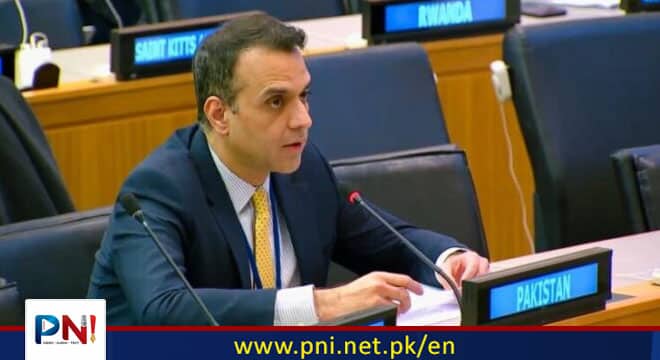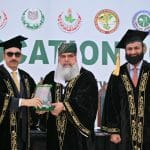UNITED NATIONS, Jul 17 (APP): Pakistan told the UN Security Council on Tuesday that it “firmly” believes in multilateral cooperation to deal with complex and interlinked challenges, such as the unresolved issues of Palestine and Jammu and Kashmir.
“We reject any uni-polar, bipolar, or so-called multi-polar world dominated by a few powerful states: Such an order contradicts the principle of sovereign equality of states,” Ambassador Usman Jadoon, acting permanent representative of Pakistan to the UN, said in a debate on ‘Multilateral cooperation in the interest of a more just, democratic and sustainable world order’.
The day-long debate was convened by Russia, the 15-member Council’s president for July. .
“Today,” the Pakistani envoy said, “we face numerous threats, arising from violations of the purposes and principles of the UN Charter, great power rivalries, a renewed global arms race, proliferating conflicts and disputes, spreading terrorism, hate, and Islamophobia, organized crime, rising poverty, and growing climate impacts.
“A just, democratic, and sustainable world must be based on consistent adherence to the fundamental principles of the UN Charter: self-determination of peoples, non-use or threat of use of force, respect for sovereignty and territorial integrity of states, and non-interference in their internal affairs,” he said.
“Strict adherence to these principles has become all the more essential in the context of recent and ongoing conflicts.”
In this regard, Ambassador Jadoon said that the UN Security Council had failed to ensure universal implementation of its own resolutions, such as those relating to Palestine and Jammu and Kashmir.
“Our efforts to promote world order, peace, and stability will fail unless we achieve universal socio-economic development, a core objective of the Charter.” Ambassador Jadoon said, pointing out that COVID-19 pandemic, ongoing conflicts, and climate change have plunged many developing countries into extreme economic distress.
“Comprehensive reform of the international financial, trade, and technology architecture is necessary to ease the suffering of a billion people in the Global South, and achieve the Sustainable Development Goals (SDGs).”
In conclusion, the Pakistani envoy proposed the following steps to promote multilateral cooperation:
1. UN Secretary-General should prepare an annual review of situations on the Security Council’s agenda where Charter’s principles and Council resolutions are violated;
2. Address rising tensions between major military powers;
3. The UN Security Council must actively promote the resolution of conflicts, including the root causes of conflict, such as foreign occupation and the suppression of the right to self-determination;
4. The UN chief should exercise his authority under Charter Article 99 more assertively, and the jurisdiction of judicial mechanisms, especially the ICJ (International Court of Justice), should be fully utilized, and,
5. Expanding the number of non-permanent members is crucial for the Security Council’s representativeness in a restructured Council. Adding new permanent members will erode the principles of sovereign equality and equity and further paralyze the Council.
During the Council’s debate, the current polarized international political landscape was also on raw display.
Russian Foreign Minister and Council President for July, Sergey Lavrov accused the United States of exceptionalism and promoting a “rules-based order” that threatens multilateralism and international law.
Washington “demands unquestioning obedience” from its allies, the Russian foreign minister said, “even to the detriment of their national interests”.
“Rule America, that is the essence of the notorious rules-based order, which is a direct threat to multilateralism and international law,” he asserted.
In response, US Ambassador Linda Thomas-Greenfield chided Russian “hypocrisy” in convening a meeting on multilateral cooperation while “wilfully and flagrantly violating” the UN Charter’s core tenets of territorial integrity, respect for human rights, and international cooperation.
She denounced Russia’s war of aggression against Ukraine, as “a war that has weaponized food”, worsening hunger not only for Ukrainians but for millions worldwide, and “that has caused Moscow to result to nuclear brinksmanship and to violate international sanctions obligations”.
Chinese Ambassador Fu Cong recalled the founding of the United Nations in the aftermath of the Second World War and the principles of peaceful coexistence advanced by his country’s leaders at the time.
He deplored the notion of a “rules-based international order” promoted by some countries, arguing that it seeks to create a parallel system outside international law, seeking “legitimacy for double standards and exceptions”.
He called on the North Atlantic Treaty Organization (NATO) to stop being the “troublemaker” and expressed concern over the bloc’s seeking expansion, creating false narratives and “stirring up a confrontation between camps”.
Follow the PNI Facebook page for the latest news and updates.








